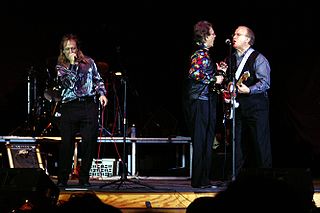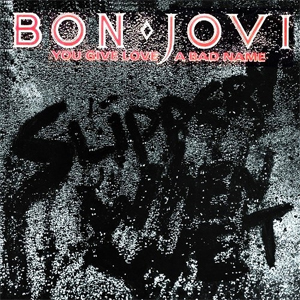
Karl Martin Sandberg, known professionally as Max Martin, is a Swedish record producer and songwriter. He rose to prominence in the late 1990s making a string of hit singles such as Britney Spears's "...Baby One More Time" (1998), the Backstreet Boys' "I Want It That Way" (1999), Céline Dion's "That's the Way It Is" (1999) and NSYNC's "It's Gonna Be Me" (2000).

"Kung Fu Fighting" is a disco song by Jamaican vocalist Carl Douglas, written by Douglas and produced by British-Indian musician Biddu. It was released in 1974 as the first single from his debut album, Kung Fu Fighting and Other Great Love Songs (1974), on the cusp of a chopsocky film craze and rose to the top of the British, Australian, Canadian, and American charts, in addition to reaching the top of the Soul Singles chart. It received a Gold certification from the RIAA in 1974 and popularized disco music. It eventually went on to sell eleven million records worldwide, making it one of the best-selling singles of all time. The song uses the quintessential Oriental riff, a short musical phrase that is used to signify Chinese culture.

The 1910 Fruitgum Company is an American bubblegum pop band of the 1960s. The group's Billboard Hot 100 hits were "Simon Says", "May I Take a Giant Step", "1, 2, 3, Red Light", "Goody Goody Gumdrops", "Indian Giver", "Special Delivery", and "The Train".

American singer Usher has released eight studio albums, ten compilation albums, eight extended plays, and 79 singles. His music has been released on the LaFace, Arista, Jive and RCA record labels. Usher has sold more than 23 million albums in the United States alone and over 65 million albums worldwide. With over 100 million total records sold worldwide, he is one of the best selling music artists of all time. He has nine Billboard Hot 100 number-one singles and 18 Hot 100 top-ten singles. In 1994, Usher released his self-titled debut album in North America, producing three singles that had moderate chart success, and the album sold more than 500,000 copies. His follow-up 1997 album My Way sold over 8 million copies worldwide, becoming his breakthrough album. It was certified six-times platinum in the US, and spawned three successful singles, including his first UK number-one "You Make Me Wanna..." and first US Hot 100 number-one song "Nice & Slow". Usher's success continued in 2001 with his third studio album 8701. It debuted at number four on the Billboard 200. The album produced two number-one singles—"U Remind Me" and "U Got It Bad". In 2002, the album was certified four-times platinum in the US for sales of 4 million copies. Its worldwide sales stand at over 8 million.

"How Am I Supposed to Live Without You" is a song written in 1982 by Doug James and Michael Bolton. The ballad has been recorded by many artists around the world, in several languages, most notably Bolton himself, becoming something of a modern pop standard. Instrumental versions of the song have been recorded featuring variously the piano, guitar, saxophone, pan flute, steel drum, and music box.

"You Give Love a Bad Name" is a song by American rock band Bon Jovi, released as the first single from their 1986 album Slippery When Wet. Written by Jon Bon Jovi, Richie Sambora, and Desmond Child about a woman who has jilted her lover, the song reached No. 1 on the U.S. Billboard Hot 100 on November 29, 1986 and became the band's first number one hit. In 2007, the song reentered the charts at No. 29 after Blake Lewis performed it on American Idol.

"Rockin' Around the Christmas Tree" is a Christmas song written by Johnny Marks and recorded by Brenda Lee in 1958; it has since been recorded by numerous other music artists. By the song's 50th anniversary in 2008, Lee's original version had sold over 25 million copies around the world with the 4th most digital downloads sold of any Christmas single.
"A Lesson in Leavin'", also titled as "Lesson in Leavin"', is a song written by Randy Goodrum and Brent Maher. It was originally recorded in 1979 by American country music singer, Dottie West, for her Special Delivery album.

"Can't Get Enough of Your Love, Babe" is a 1974 song written, recorded, and produced by American musician Barry White. Released as the first single from his third album, Can't Get Enough (1974), the song topped the US Billboard Hot 100 and Billboard R&B charts and has since become one of his signature tunes. It was his second US chart-topper, after "Love's Theme". It became a gold record in the US.
Jerry Kasenetz is an American bubblegum pop producer who worked with Jeffry Katz, the two working together as the Super K Productions company, to manufacture and produce bands such as Kasenetz-Katz Singing Orchestral Circus, The Music Explosion, 1910 Fruitgum Company, Crazy Elephant, and The Ohio Express.

Simon Says is the debut album by the American bubblegum pop group the 1910 Fruitgum Company on the Buddah Records label. Released in 1968, it included two songs that appeared on the Billboard Hot 100—the most from any of the group's albums—although it was not their highest-charting album. It's been debated whether or not the members of the band actually played on the album since the Ohio Express, another band put together by Super K Productions, actually consisted of two groups: one that produced the records and another that toured and promoted the name. This is countered by original drummer Floyd Marcus, who has stated that all five men listed really were behind the instruments.

1, 2, 3, Red Light, the second album by American bubblegum pop group the 1910 Fruitgum Company, was released six months after their debut album, Simon Says. The title song written by Sal Trimachi and Bobbi Trimachi, was the albums' only hit single for the band, peaking at #5 on the Billboard Hot 100, with both the album and the single just barely missing the success of their first release.

"My First Kiss" is a song recorded by American electronic duo 3OH!3. The song was written by Lukasz Gottwald, Sean Foreman, Nathaniel Motte and Benny Blanco, and was produced by Dr. Luke, and Blanco for their third studio album, Streets of Gold (2010). The song was released as the lead single from Streets of Gold on May 4, 2010. The song's inspiration is about going through one's first kiss and exploring further parts of a relationship.
"Simon Says" is a bubblegum pop song written by Elliot Chiprut and originally recorded in 1967 by the 1910 Fruitgum Company, becoming their most successful chart hit.

"Give Me Everything" is a song by American rapper and singer Pitbull featuring Dutch DJ Afrojack & fellow American singers Ne-Yo and Nayer. Written by the former three and produced by Afrojack, it was released on March 17 2011, through Polo Grounds Music, Mr. 305 Entertainment, and J Records as the second single from Pitbull's sixth studio album, Planet Pit (2011). Rolling Stone described the song as a "club-pop cut with a plaintive Ne-Yo chorus."

"1, 2, 3, Red Light" is a song written by Sal Trimachi and Bobbi Trimachi and was recorded by 1910 Fruitgum Company for their 1968 album, 1, 2, 3, Red Light. The song charted highest in Canada, going to number 1 on the RPM 100 national singles chart in 1968. In the same year in the US, it went to number 5 on the Billboard Hot 100 and was on the charts for 13 weeks.
"Indian Giver" is a song written by Bobby Bloom, Ritchie Cordell, and Bo Gentry. It was first recorded by 1910 Fruitgum Company for their 1969 album, Indian Giver. The song went to #5 on The Billboard Hot 100 in 1969 and was on the charts for 13 weeks. Its B-Side, "Pow Wow", was actually a song called "Bring Back Howdy Doody" deliberately pressed backwards as a way of deterring radio stations from playing the B-Side, which was later recorded by another Buddah bubblegum music group produced by Jerry Kasenetz and Jeffry Katz called Flying Giraffe.

"The Greatest Love of All" is a song written by Michael Masser, who composed the music, and Linda Creed, who wrote the lyrics. It was originally recorded in 1977 by George Benson, who made the song a substantial hit, peaking at number two on the US Hot Soul Singles chart that year, the first R&B chart top-ten hit for Arista Records. The song was written and recorded to be the main theme of the 1977 film The Greatest, a biopic of the boxer Muhammad Ali, and is performed during the opening credits.

"Moonflight" is a song written and originally recorded by Vik Venus in 1969. It is a 'break-in' song, with popular hits of the day interspersed at humorous points throughout the song in response to spoken-word prompts, in the style of Dickie Goodman, who had many such hits. "Moonflight" became a hit during the summer of '69, reaching #38 U.S. Billboard and #23 Cash Box. It also charted in Canada, where it reached #20. It did best in South Africa, however, where it reached #7.
"Cuff It" is a song by American singer Beyoncé, taken from her seventh studio album, Renaissance (2022). The song was written and produced by Beyoncé, Nova Wav, Morten Ristorp, Raphael Saadiq and The-Dream, with additional writing being handled by Nile Rodgers. The song contains an interpolation of "Ooo La La La", written by Allen McGrier and its performer Teena Marie. It was sent to French radio on September 28, 2022, as a second single from the album. It impacted rhythmic and urban contemporary radio in the United States on October 4, 2022.















